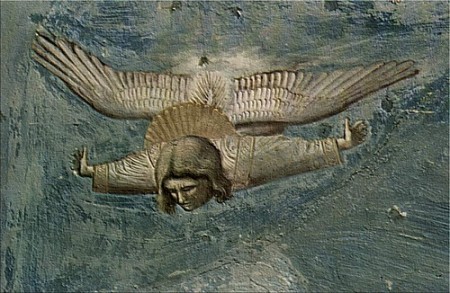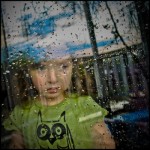
I always had a hard time linking forgiveness and peace with my early family life. In fact, it was hard for me to understand what forgiveness itself was all about. I thought of it as a remote dream, a utopian feeling. There were many people I had struggled with, and I often let go the anger and blame I had felt, restoring my own sense of balance. If that was forgiveness, it seemed too one-sided to work on the bonds between people. On my rational side, I couldn’t quite get it.
But things can change.
I promised my mother I would do one last thing for her after she was gone. So, about a month after her death, C_, my wife, and I drove to Mill Valley, not far north of San Francisco, and met my cousin M_ at a local cafe. We were then to drive on to Bolinas Ridge, overlooking the Pacific Ocean, where we would scatter my mother’s ashes.
At lunch, I asked my cousin, who’s 15 years older than I, about his early memories of my mother. He told me a few things I hadn’t known. His father had lost his job on Wall Street in 1930 and then went to San Francisco to attend law school. During that time, M_ and his mother, Mom’s oldest sister, lived at home in Manhattan with his grandparents. By that time, my mother had long since broken free, bought her first car – a black Ford coupe – and driven across the country on her own to visit a few friends in Los Angeles, as well as her brother-in-law in San Francisco. That would have been in the late 1920s, and after that she made several trips back and forth to the west coast, always impatient to be on the move.
From his earliest years, M_ experienced my mother as a strong dominating presence, someone who immediately expressed her thoughts with no censorship or concern about others’ feelings. Her independence impressed him – she was a fearless adventurer to a boy growing up in Manhattan. During that period of his youth in the 1930’s, his impression of Mom was that she came and went a lot but never stayed long.
As he grew older, he appreciated her as talented, smart and ambitious about succeeding in business, but unable to advance very far because she was a woman. She managed the office of a wealthy dermatologist, and later did the same for a famous song-writer – even organizing and running the production of a Broadway musical he had written. M_ thought she could have run anything.
By the time my brother and I came along, she was a very different person. Frustrated, even embittered by confinement in a marriage that wasn’t going well, she was in turn prostrate in depression, quietly furious or stonily silent, the mood I dreaded most. When we had visitors, though, she was bright, sociable and funny – and so vivid, especially when sweeping into a dinner party in her bright red, satin evening dress.
But the daily and nightly routines among the four of us at home were anything but bright. The understated fury between my parents, the bitter arguments, the knife-point words, the moments of overt violence, the impassivity of my mother’s face – that was the dangerous flack of boyhood. It’s not that there wasn’t love as well – it was just buried so deep we hardly ever noticed. Every now and then, though, my irrepressible brother would pull Mom and me into a “chain kiss,” and round the tight circle we’d go, kissing cheek to cheek, arm in arm, as close as we would ever be.
For dispersing Mom’s ashes, my cousin had found an area along Bolinas Ridge – well-known to my mother for its windswept, rounded hills and vast-horizon views of the Pacific. We made a couple of stops, each time walking a hundred yards or so from the road to small groves of trees sculpted by relentless winds. We took turns scattering ashes from atop boulders among the cypress and redwoods. C_ felt the location was just right, close to the ocean my mother loved but not in it. (Mom couldn’t bear the thought of her ashes being eaten by the fish at sea.) The second spot was right above Stinson Beach – a favorite walking place of hers. It was a warm, clear day, with only a gentle sea breeze, but all around us the bent-back trees had captured the violence of storm after storm.
After we’d scattered the last of the ashes, M_ said perhaps she’ll rest in peace. I said peace was not her thing. Yet at the moment, I could feel nothing but peace, and a simple love for her that finally pushed aside the tension and simmering anger that usually filled me. She really had let go of her own hurt and frustration in her last months and had reached a sense of acceptance I had never seen in her before. I could begin to feel what that letting go was like. I wanted just then to leave behind the inner violence of all that had happened so many years before, stop thinking about whatever hurt had shaped her as a kid, what she had passed on to me, and the fears I had about leaving a similar legacy to my children. Let the breezes carry that away just as they carried off the ashes.
Somewhere it all had to stop, the cycle of hurt and self-hate broken, and the love that bonded even a screaming family together – however weak or lost that force of gentleness might have seemed – had to come through as the only memory and feeling worth keeping. I tried to put the broken parts of her life back together again and see her as the complicated, rich being she had been – and as the adventurer in her soul, driving across country in her latest car, heading west just to be heading somewhere.
That’s when forgiveness finally meant something to me – the love emerging from its hiding place, the past let go in whispers, and the best of that shared life vivid again in my feelings and memory.
Image Credit: Some Rights Reserved by carulmare at Flickr



I think forgiveness comes in recognizing all are doing the best they can at any given moment while facing the challenges on their life’s path. I view life as Earth 101, an assignment full of challenges that ultimately produce strength. In that, acceptance comes, even gratitude, for everything that comes contains an important lesson. Thank you for sharing your heartfelt story; it could have been written by my son.
Louise –
Thank you for this wise and thoughtful comment. What you say about forgiveness does ring true for me – especially as it relates to the family I grew up with. And I’m with you about the challenges – each one is a learning experience.
Thanks for coming by.
John
Wow, what a sad and beautiful story. Even hurtful families are a mixed bag of dreams and disappointments…’the past let go in whispers’ is a great image as Jaliya said.
I do not forgive, but maybe someday I will too. Ellen
Thank you, Ellen – I hope you do get there – forgiveness is a blessing.
My best to you — John
“… the past let go in whispers …”
— Yes, that’s what it’s like to forgive 🙂
Thank you so much for your story, John … 🙂
P.S. There’s a conversation going on about forgiveness at my blog (http://postcynicalseer.blogspot.com) and Michele’s Parasites Of The Mind (http://parasitesofthemind.blogspot.com/) …
Thanks, Jaliya –
I’ll check out that conversation. There are still mysteries for me in forgiveness.
Thank you for commenting!
All my best — John